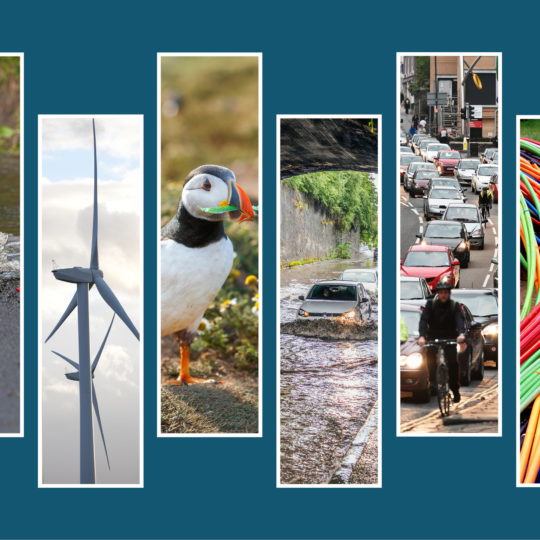Baseline Report: Social research
Social research on the public's priorities for future infrastructure and attitudes towards possible solutions to address urban congestion.
To inform its analysis for the Baseline Report, the Commission commissioned social research into the public’s priorities for the UK’s infrastructure and – more specifically – public attitudes towards congestion charging as a possible solution to urban congestion.
Public priorities for infrastructure
The Commission asked PwC to research public attitudes towards the UK’s infrastructure (specifically the six sectors analysed in the Baseline Report: digital, energy, water and wastewater, flood resilience, waste and transport) and help the Commission to understand what people’s priorities are for the immediate future and the next thirty years and more.
In summer 2021, PwC surveyed over 6,000 individuals and held a series of deep-dive discussion groups and in-depth interviews to explore how the public saw the state of current infrastructure provision. In particular, the research wanted to understand the public’s awareness of the trade-offs and choices that government faces in responding to changing demands on infrastructure services, such as from the impacts of climate change. The research showed among other things that:
- three quarters of those surveyed recognised that good infrastructure services were essential for people to have a good quality of life
- addressing climate change must be an important factor in the UK’s long term planning for infrastructure
- protecting the environment and ensuring the quality of infrastructure provision are the two factors people believe the Commission should prioritise in its future work.
Deliberative engagement: Tackling urban congestion
For the first time, the Commission undertook an extensive programme of deliberative workshops with members of the public – in conjunction with Britain Thinks – to understand how the issue of congestion and its impacts on their lives and, more importantly, what shaped their views when it came to consideration of possible policy solutions, such as congestion or road pricing.
Deliberative engagement is an approach which gives participants more time and background evidence to consider and talk through the trade-offs involved in an issue that might otherwise be possible with other forms of engagement; this gave the Commission valuable insight into the principles and values that members of the public bring to such a thorny public policy challenge. The process and findings underwent independent external evaluation by 3KQ.
This is the most comprehensive major deliberative study of attitudes to congestion, and showed that people felt:
- investment in public transport must be a priority in efforts to tackle urban congestion
- doing nothing was not considered an acceptable approach for the long term
- people were more open to the idea of congestion charging when given more information on the efficacy and rationale for its use.
The findings from the process of deliberative engagement – a summary of which can be found on the first button below – demonstrate that they can be a valuable tool for providing in-depth insight into public attitudes, particularly in helping to understand how people might make value judgements and engage with policy trade-offs.
This short video gives an insight into this process:

Status: Completed
Second National Infrastructure Assessment: Baseline Report
An analysis of the current state of key infrastructure sectors
Reports & StudiesDesign & Funding Digital & Data Energy & Net Zero Environment National Infrastructure Assessment Place Regulation & Resilience Transport Water & Floods